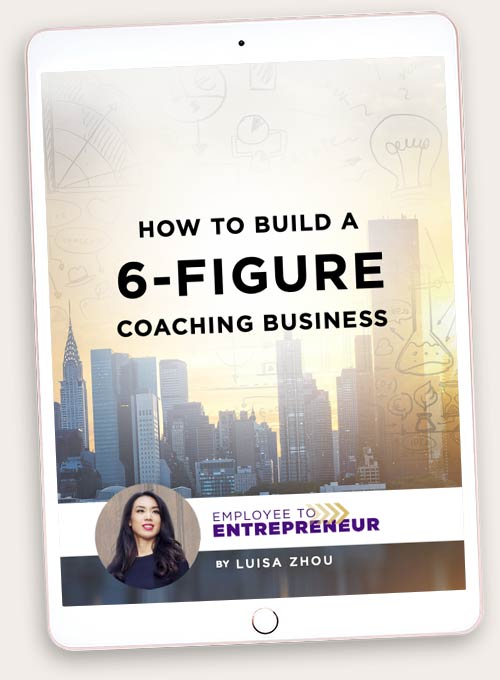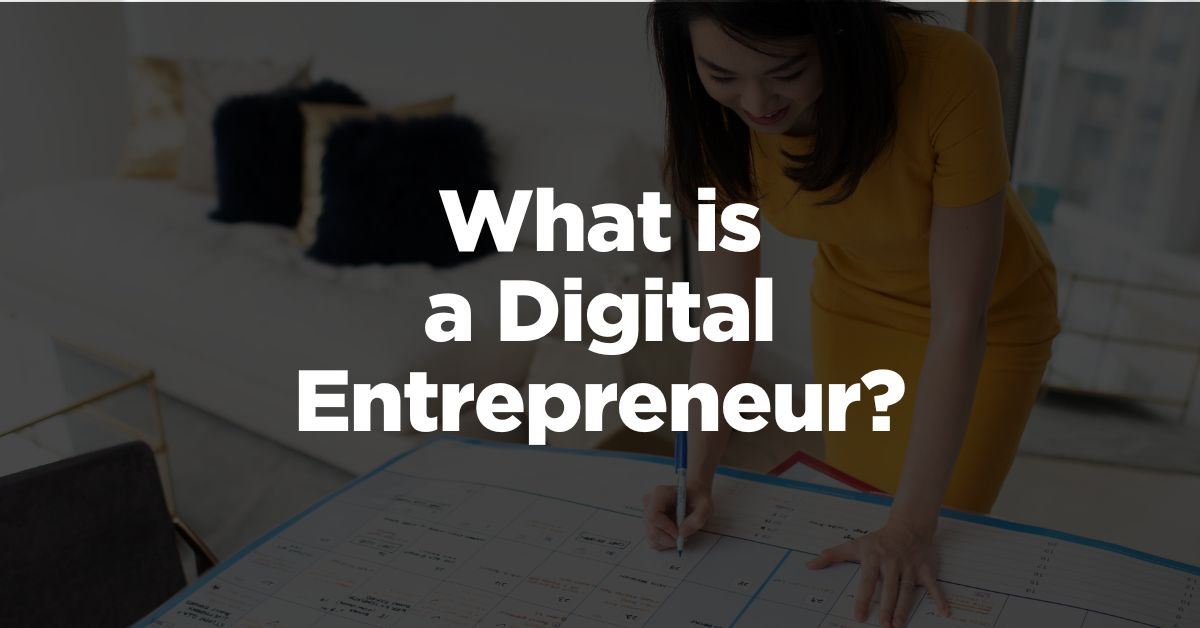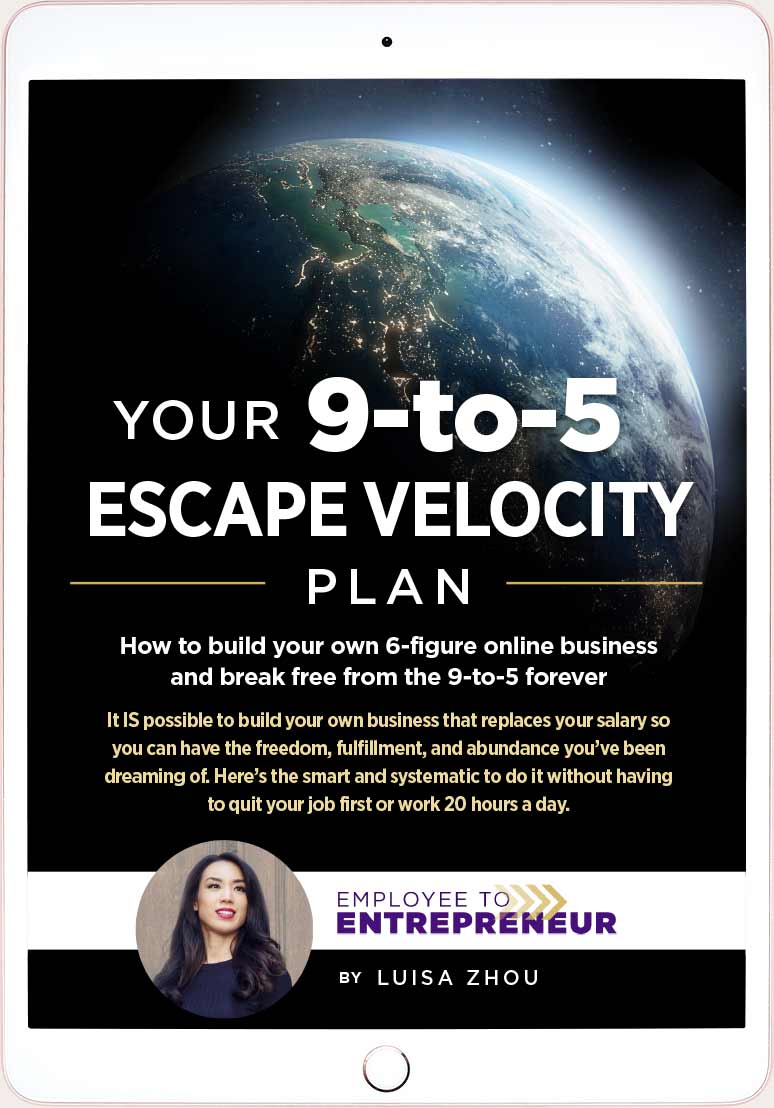This is the ultimate guide to digital entrepreneurship.
Digital entrepreneurship affords you plenty of perks, including:
- Freedom
- Flexibility
- Income
…And so much more.
Want to learn more? Read on.
What is a digital entrepreneur?
A digital entrepreneur owns and runs an online business.
That means their business doesn’t have a physical location. They rely 100% on internet-based tools to market, create, and deliver their services and products.
By owning a digital business, entrepreneurs have more opportunities to build, grow, and scale their businesses while keeping overheads low.
That’s what I do – I run a fully remote business that doesn’t require more than a few hours of my time per week. As I work mostly with contractors, my business is extremely flexible and profitable.
Get the Ultimate Guide
for building a
6-Figure Coaching Business so you can achieve more freedom!
But more on that in a bit.
First, let’s dive a little deeper into the differences from “traditional” entrepreneurship.
Digital entrepreneurship vs. traditional entrepreneurship
Digital entrepreneurship and traditional entrepreneurship are very similar.
In both cases, you work for yourself and have the freedom to build a business you care about.
But what are the differences? Let’s dive in.
| Digital entrepreneurship | Traditional entrepreneurship | |
| Operations | Online businesses have complete freedom of location because they operate online. That also means they can work with clients and hire people from around the world. 16% of US companies are now fully remote and manage their businesses online. | Traditional businesses tend to have office or retail locations which limits your freedom as an entrepreneur. Having a physical presence means you’d need to hire in the local area. It also limits your operational hours. |
| Set up costs | Setting up a business online costs very little. You don’t even need a website in the beginning. You can use free tools like social media to market your services. Digital products require no inventory, warehousing, or shipping. And you can deliver online services through free platforms like Zoom. That’s why 50% of US businesses started in the founder’s home. | Physical businesses require a physical location. That means paying rent, storage, shipping, and so on. If you’re creating original products, you’ll also have upfront production costs to consider. It’s common for traditional entrepreneurs to seek funding to help offset these startup costs. But with more entrepreneurs switching to online operations, this number is dropping. |
| Scalability | Digital businesses can sell their products at scale and internationally. Scaling is tougher for online service businesses but adding other scalable income streams like online courses or other digital products can help. | The number of customers you can service and where depends on your physical location. For example, if you sell products, you have warehouse space and shipping limitations. Or if you have an in-person service business (like a hairdresser), you’re limited to the size of your salon space and local customers. |
| Profitability | Due to the lower set-up costs, online businesses tend to have high profit margins – especially digital product businesses. | Although 94% of Americans still shop in physical stores, the cost of running a physical location reduces your profitability. This is why small brick-and-mortar businesses are struggling while large corporate companies are thriving. |
What are the benefits of becoming a digital entrepreneur?
Becoming a digital entrepreneur has plenty of benefits. Here are the top four:
You can work on them anywhere
With no physical location holding you back, you’re free to work from anywhere in the world.
Plus, you can grow your business from home or while traveling as long as you have an internet connection.
Because your business is location-independent, you’re able to work with clients globally.
That leads us to the next benefit…
You have lower costs
Traditional businesses have a lot of start-up costs.
You have to pay for:
- Rent
- Inventory
- Furniture
- Cleaning
- Storage
Online businesses have much lower costs.
Does that mean you can start an online business for free?
Almost – but all businesses come with some costs.
You might need to pay for things like:
- Web hosting
- Advertising
- Licenses
- Software
For example, an online course business would need course software or plugins to deliver your program to customers.
But you can save on marketing costs by choosing the right marketing strategies. (For example, asking your network for client referrals is an easy way to get started.)
They have high scalability
Online businesses tend to be much easier to scale than traditional businesses.
Why? Well, physical businesses are bound by location and size.
Even with extra employees, you can only service so many clients or customers.
Your digital business can scale much more flexibly because you can:
- Reach new markets: No matter where you are, you can attract and work with clients from anywhere.
- Streamline with tech: Your native online business can take full advantage of software to create predictable sales and delivery systems. For example, you can make an email sales funnel to automatically sell your products and services.
- Forget trading time for money: Being a digital entrepreneur allows you to create passive income streams. You can also price your services in line with the value you bring instead of the time you put in.
Note: Some digital businesses are easier to scale than others.
Take a consulting business versus an e-commerce business.
The consulting business can service multiple clients with high-ticket packages. Plus, adding a digital product could add a passive income stream.
An e-commerce business selling physical products would be limited to the amount of products you can create, store, and sell.
However, an e-commerce business still has a higher potential to scale than a physical store.
You have flexibility and freedom
When I asked some of my students why they wanted to build an online business, the main reason was freedom.
Digital entrepreneurs have the flexibility and freedom to manage their own working lives.
That means taking a vacation when you want to, prioritizing family, creating a work schedule that works for your energy, and so on.
So how does this compare to being a traditional entrepreneur?
Well, all entrepreneurs have ownership of their time, but traditional businesses have more constraints.
For example, if you run a hair salon, you would need to operate within your business hours.
Next up: The step-by-step guide you need to start an online business.
How do you become a digital entrepreneur in 6 steps?
Get the Ultimate Guide
for building a
6-Figure Coaching Business so you can achieve more freedom!
Now you know the benefits of starting a digital business.
And here are the steps you need to start your own:
Find your business idea and niche
To be a successful digital entrepreneur, you need the next billion-dollar idea, right?
This is a common misconception.
You don’t have to be an Elon Musk or Oprah Winfrey (although they are inspiring entrepreneurs to look up to).
Instead, the best business idea for you is way simpler than that:
Create a business that pays you for your current skills.
For me, that was knowing paid ads.
Using my skills, I started a digital advertising consulting business on the side of my corporate job and made it into a six-figure business.
Now it’s your turn. Think about the existing skills you have from:
- Your corporate job
- Your hobbies
- Your life experiences
One or two of these skills might jump out at you as a potential business opportunity.
Then it’s time to research the market.
Keep reading to learn more.
Research the market
Ask yourself: Who do I want to serve with my business?
Your target audience is crucial to making your digital business sustainable, so think about your niche.
For example:
You could start a career consulting business for grad students, mid-level career women, or high-level executives.
But your pricing, marketing strategy, and messaging will be completely different for each ideal client.
If you’re stuck, aim for an audience that can afford your services and has something in common with you.
Take my student Mara Freilich.
She was a lawyer who graduated from a top law school. And nw, she’s a consultant helping students get into their preferred law schools.
Now that you have a market in mind, answer this: Do they need my product or service?
This part is more practical. You can validate whether there is a need for your work in a few simple ways:
- Survey potential customers directly: Sometimes your target customers are closer than you think. Reach out to your network to see if anyone can connect you to a potential customer. Then, interview this person on what they would need most from a business like yours.
- Google similar businesses to yours: If you can find similar businesses to yours on the market, don’t take it as competition. It’s actually a good thing. Established successful businesses show that there is a market for your services.
- Look at forums in your niche: Where does your target audience hang out online? Could be forums like Reddit, LinkedIn, or industry-specific spaces. Once you find them, look at what people are saying. What are their pain points? This could give you ideas for developing your offer.
These will all give you clear indicators of whether your business will make money.
You’ll also learn what your audience wants the most. With that information, you can develop your offer.
That’s what we’ll talk about next.
Develop your product or service
Now you know your niche and the market you want to serve, it’s time to develop an offer.
There are three different kinds of offers:
- Digital services
- Digital products
- Physical products
Let’s break down each of them in detail:
Digital services
Selling digital services is the most profitable way to start a business.
Not only can you make money with the skills you already have, but it’s also a very low-cost business model to run.
This model works for coaches, consultants, and freelancers of all kinds.
All you’ll need is an online presence (like a website or social media) and a platform to deliver your work.
Then you can define a pricing strategy that works for you.
The most common pricing strategies are:
- One-off: One-off packages have a single price for one-time services.
- Project-based: If your work requires a fixed amount of time to see results, you can charge per project.
- Subscription/Retainer: Ongoing work is best priced on retainer. That means receiving a monthly fee for your services.
- Bundle: If you have multiple skills, you can bundle your services into a package.
Once you’re working with a few clients, you can create digital products to bring in “passive” income.
Digital products
The most common types of digital products are e-books, online courses, software, and so on. You typically sell them via a download link or online access.
To create a digital product, you need to first outline the content. For online courses, this could be identifying the step-by-step structure of the program.
Then use low-cost or free tools like Canva to design and create your product.
Ready to start selling?
Figure out a marketing strategy to launch your product to your target audience and keep improving the product as you get feedback.
Physical products
You don’t need a physical store to sell physical products.
Sure – e-commerce businesses can be wildly successful. But they do require more logistics and investment to get started.
The development process is similar to digital products:
Designing and creating the product or finding suppliers.
Then you’ll need to figure out storage, warehousing, and shipping.
These stages all cost money before you’ve made a single sale. That’s why I recommend starting with digital products before moving on to physical ones.
Set up your business
Get the Ultimate Guide
for building a
6-Figure Coaching Business so you can achieve more freedom!
So how do you set up a business?
To simplify things for you, I’ve made this comprehensive checklist of every step.
But in short, here are three of the most important steps:
- Decide on a business structure: The most common options for digital entrepreneurs are sole proprietorships and limited liability companies (LLCs). A sole proprietorship is simple to set up. An LLC offers benefits like legal protection but takes more effort to set up.
- Register your business: If you run a digital service business with no licenses or permits, registering is as simple as letting your local government know your business name. Plus, if you run a business as yourself and use your own name, you might not need to register at all. It’s vital you check the rules in your local area.
- Get licensed (if needed): Check if you need any official licenses to sell your products and services. Fortunately, most online businesses can skip this part. But if you’re in regulated fields like law or accounting, you might need a certification or license.
- Set up your bank accounts and insurance (if needed): It’s good practice to separate your business income from your private income. Open a professional account for your business and apply for any insurance you might need. Again, this depends on your niche.
With your business all set, it’s time to get your first clients/customers.
Find your first client
Now you’re ready to find your first customer.
The thing that works the most? Building trust.
Because here’s the thing: No one knows you yet.
So building trust should be your top priority.
Here are a few ways you can build trust with your audience:
- Guest host on established podcasts within your niche
- Create high-value content with your target audience in mind
- Reach out to your network to see if anyone is interested in your services
By working with your first one or two clients, you can get valuable testimonials that will help you find your next clients.
Market your business
In the previous section, we talked about relatively simple strategies to get your first clients.
From there, you can market your business more broadly.
For example:
If guest hosting on podcasts works for you, keep going!
Doubling down on what’s already working will be better for your marketing strategy as you grow.
My advice is to focus on just one or two strategies at a time. And make sure those strategies make sense for the stage of business you’re at.
I started growing my business with Facebook groups and paid ads. Now, I focus on YouTube and SEO.
Keys skills you need to become successful digital entrepreneurs
Here are some entrepreneurial skills successful digital entrepreneurs have:
- Tech skills: As a digital entrepreneur you need to know your way around a computer. But you don’t need any programming or coding skills. Most of the tools you’ll need to start your online business (like website, course, video call, and social media platforms) don’t require any technical knowledge. And if you need help with any of the tech you need to use, there are plenty of tutorials on Google and YouTube to walk you through it.
- Adaptability: Great entrepreneurs can shift their plans and focus when their businesses need it. For example, let’s say your current marketing strategy isn’t working. You need to stay adaptable to shift directions. The key is not to stay stuck when you need to change course. Take fast action and experiment with new avenues to make your business work. The key question is “How can I make this work for my business?”. Keeping that at the front of your mind leads to greater success down the line.
- Effective communication skills: Listening, empathy, and clear communication are essential to being a successful digital entrepreneur. This is even more important when operating online. Practice being open and understanding when reading and sending messages online and it’ll help boost your reputation as an entrepreneur.
- Online marketing and sales skills: Becoming a strong marketer online requires studying what’s working for other brands and staying flexible to new ideas. The online landscape is always changing, so use your adaptability to switch your marketing strategies when you need to. As for sales, this is all about the human touch. Knowing how to write good sales copy and have effective sales calls is crucial for long-term success as an entrepreneur.
Want to know more about the skills you need to become an entrepreneur? Check out this video:
Best digital business ideas with low investment
Ready to start your own online business?
Here are some low-investment ideas:
Online courses
Selling online courses can be highly profitable. And you can create a course about pretty much anything. With platforms like Teachable, making an online course is relatively simple.
However:
I don’t recommend starting a course business in the beginning.
Start by working with a few clients one-on-one and then translate your methods into a course.
Coaching
Coaching involves guiding and advising your clients to help them achieve their goals. It’s a great digital business model because you can cash in on the skills you already have.
Plus, the cost to start up is so low. To get started, you don’t even need a website. You can build your experience by pitching your services to potential clients and creating valuable content on social media.
That’s how I started (more on my story of becoming a coach here).
Consulting
Consulting is similar to coaching, except you give your clients more solutions to solve their problems. On the other hand, coaches guide their clients to solve their own problems. You can get into consulting using skills you’ve gained in your 9-5.
For example:
PR, HR, law, and tech are all popular consulting niches.
Productized service
Want to become a freelancer? Productizing your service can help you define, package, and sell more. You can price your productized service with one-off or project-based pricing.
Some common examples include programming, freelance writing, virtual assisting, and so on.
Affiliate marketing business
If you want to generate passive income, affiliate marketing is worth checking out. Affiliate marketers earn commissions by advertising other people’s products.
It takes time to build a large enough audience to make a sustainable business, but affiliate marketing can be a great side business to start.
You can find more ideas in this video:
How much does a digital entrepreneur make?
Ultimately, your income isn’t capped as a digital entrepreneur. You can make more money than in your current job.
Get the Ultimate Guide
for building a
6-Figure Coaching Business so you can achieve more freedom!
Self-employed families tend to have a higher net worth than salaried ones ($380,000 versus $90,000). At the same time, the average salary of self-employed people has been estimated at $68,000.
Ultimately, one of the benefits of being a digital entrepreneur is that you don’t have many of the fixed costs of businesses with a physical presence – and you typically leverage tech to achieve a high profit margin.
Next steps
And there you have it! Everything you need to know about becoming a digital entrepreneur.
Owning an online business can help you scale and grow more than a physical business ever could.
But there are a few key steps you need to follow to become a successful digital entrepreneur.
I’ll show you exactly what they are in this free blueprint:

Want to Build a 6-Figure Coaching Business So You Can Achieve More Freedom?
When you sign up, you’ll also receive regular updates on building a successful online business.
Read more:
The Top Characteristics of Successful Entrepreneurs
How to Think Like an Entrepreneur
Top Habits of Successful Entrepreneurs








